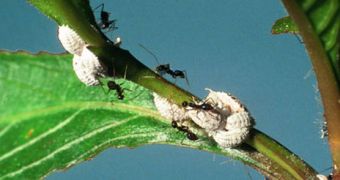Longhorn crazy ants are a peculiar species of insects. They can mate with their siblings to produce viable offspring, but experience none of the effects of inbreeding that other species experience if they take the same approach to reproduction.
It would also appear that this strategy is helping the ants establish a world domination. They are among the most widespread invasive species in the tropical world, experts say, and is all due to incest.
The odd reproductive biology they are employing gives Paratrechina longicornis a lot of power over other species of ants, explains Free University of Brussels evolutionary biologist Morgan Pearcy.
In order to get an idea of how widespread this species is, consider that scientists don't even know where they originated from. There are so many of these ants at the tropics that establishing a clear point of origin for the population is impossible.
The reason why these animals are called crazy ants is because they tend to move around erratically, without following foraging trails established by ants that came before them. From above, they appear to be moving like crazy, with no clear pattern, Science News reports.
In a paper that was published online in the January 31 issue of the esteemed scientific journal Proceedings of the Royal Society B, experts explain that some queens produce genetically-identical daughters, with which they share all their genetic material.
At the same time, the sons the queen produces are genetically identical to their fathers, which means that they can pair with the queen's daughters with no risk of inbreeding. Their mating is equivalent to the pairing of nonsiblings, scientists say.
German researcher Jürgen Heinze, who is based at the University of Regensburg, says that the work authored by Pearcy and colleagues is the first to link this reproductive behavior to invasive success.
Longhorn crazy ants are harmless to people, in the sense that they do not sting or bite. However, they carry pathogens around, and move extremely fast. Many hospitals have special defense methods against them, as they have become a potent source of infection.
According to the research team, the reason why some eggs produce offspring that are clones of their father is that the queen produces them empty. That is to say, none of her genetic material is passed to them.

 14 DAY TRIAL //
14 DAY TRIAL //